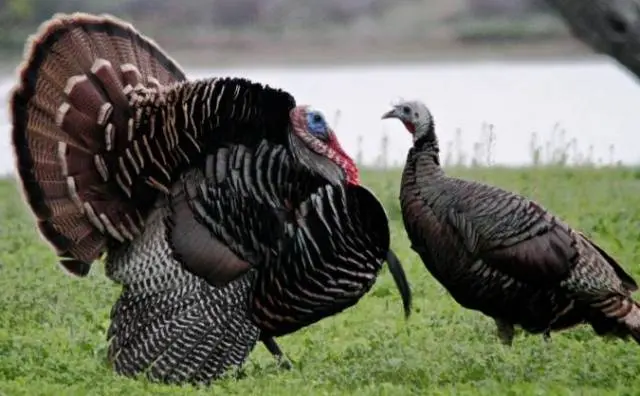Contents
Bronze broad-breasted turkeys are highly valued among farmers. They stand out from other breeds for their size. Bronze turkeys were originally bred by American breeders. It can be seen that they tried very hard, because the breed turned out to be just perfect. It was created for the purpose of industrial cultivation on farms. Now everyone can buy turkeys of this breed for themselves, and breed them at home.
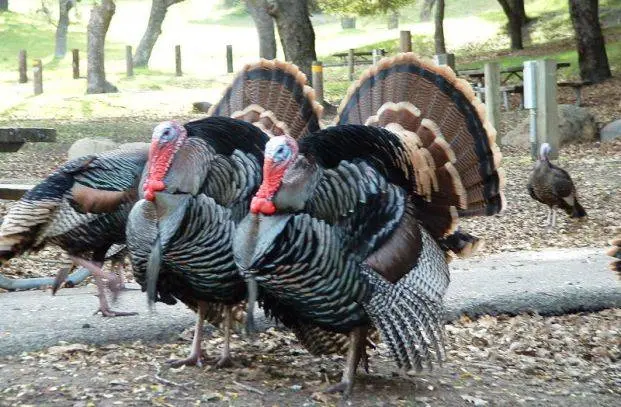
Breeding bronze turkeys, breeders wanted to get a fleshy breed that would be profitable to grow for large enterprises. Until now, they are the largest representatives among turkeys. It is worth considering what other features, besides size, this breed has. In this article, we will see all the advantages and disadvantages of bronze wide-chested turkeys. We will also see how to properly grow and care for these birds. All these factors will make it clear why this breed of turkeys has become so popular, and why more and more farmers choose it for breeding.
Description and characteristics of the breed
Representatives of this breed grow very large. Probably not to meet a single bronze broad-chested turkey that would weigh less than nine kilograms.
Experienced farmers claim that with abundant feeding and following the rules of care and reproduction, it is possible to grow turkeys weighing up to thirty kilograms. Bronze turkeys have another name – “American”. It reminds that the breed was bred in America.
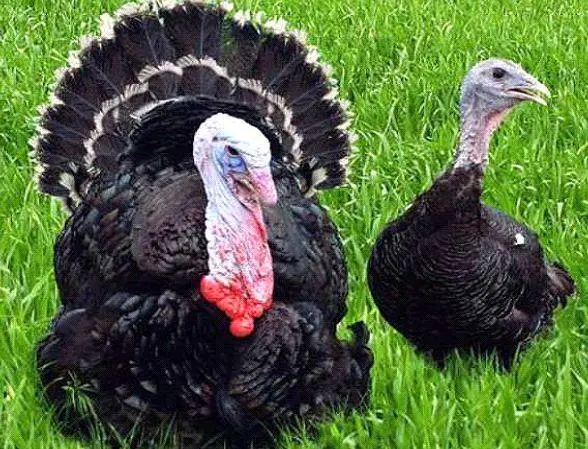
The body of these birds is oval, the chest is wide, convex and very strong. Graceful gait and powerful legs give the breed even more nobility. The bronze broad-breasted turkey has a beautiful plumage, black feathers shimmer in the sun with a bronze, purple and gray hue. Bronze is the predominant color, as the name of the breed indicates. Males are distinguished by a fan-shaped chic tail.
Advantages of the breed
There are a large number of advantages of this breed over other types of turkeys. We will try to list the main advantages:
- high egg production. These turkeys differ in both quality and quantity of eggs. In one season, a turkey can carry about 120 of them. Of these, 96 eggs can be fertilized, and 67 will hatch into small turkeys;
- maternal instincts. Turkeys of this breed are caring and attentive mothers. They hatch their offspring with great patience. Moreover, they can also be planted on the eggs of other birds, such as chickens or ducks;
- precocity. At the 20th week of life, bronze turkeys can weigh up to eight kilograms, and turkeys – at least fourteen kilograms;
- profitability. It is not necessary to feed these turkeys for a long time. They are usually slaughtered twenty weeks after birth. The reason is that after this age, birds need a lot more food to maintain their weight, and even more so in order to build even more muscle mass.
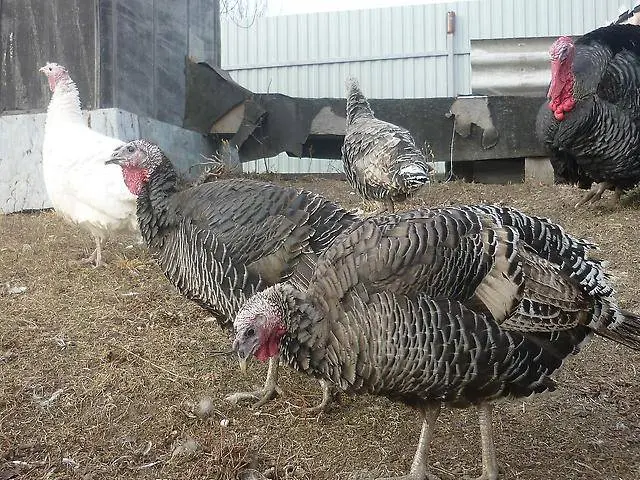
Disadvantages of bronze turkeys
The bronze broad-breasted turkey is suitable exclusively for breeding in industrial conditions. They will not be able to fully develop in pastures or even in the yard. Only cages and sheds are suitable for growing bronze wide-breasted turkeys. You can feed these birds only with balanced feeds containing all the necessary vitamins and minerals. You should also add various supplements. You can cook a mixture of grain and chopped grass for turkeys. And veterinarians advise adding special vitamin complexes from time to time. As you can see, breeding such large individuals is a little expensive, but the resulting amount of meat is, of course, worth it.
Productivity
The bronze broad-chested turkey has a very high survival rate. They are disease resistant and strong. All thanks to the original breed, by crossing which bronze turkeys were bred. She was distinguished by high levels of endurance, and had excellent health.
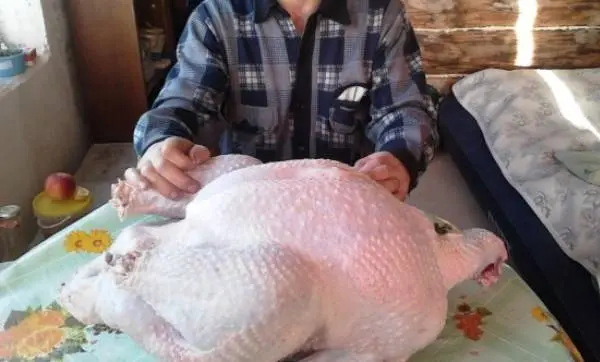
The main purpose of breeding this breed is to obtain high-quality and tasty meat. It tastes a bit like game. A big plus of turkeys being carved young is that the meat remains tender and soft. Moreover, up to 80% of the total weight of the carcass is meat. It is an excellent dietary product, because it contains only 8% fat.
Turkey eggs are also used in cooking. They are round and large. They have an unusual brown color, specks of different sizes are located throughout the egg. They can be seen in the photo.
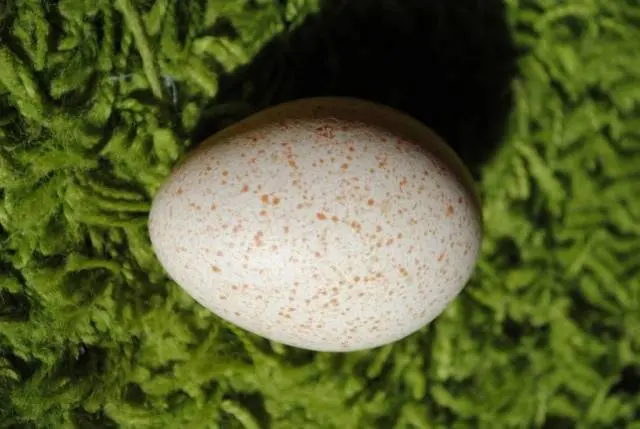
Turkeys of the bronze broad-breasted breed begin to lay as early as nine months of age. The minimum number of eggs laid per season is about 60 pieces, and the maximum is about 150 pieces per year. They not only can hatch the eggs of other bird species, but also take care of them as if they were their own. Turkeys can easily be trusted with small geese, ducklings and chickens.
Breed care
The bronze broad-breasted turkey can fully grow only in a spacious room. It is very important to maintain a stable temperature in it, as well as air humidity. These birds do not tolerate drafts well. For a normal stay of one individual, you need 1 m2 space. Birds should not sit on a cold floor, so it should be lined with hay or straw. The room with turkeys should be well lit and also have ventilation.
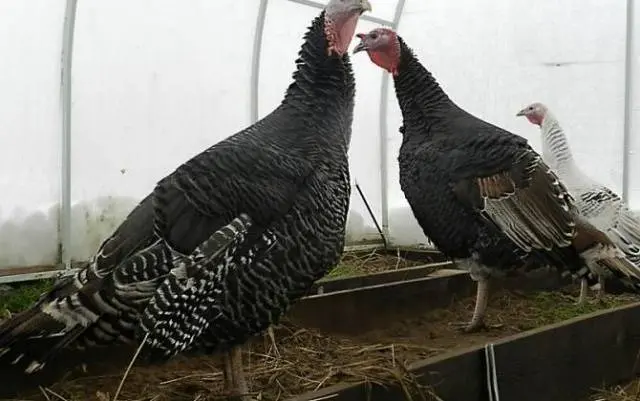
For birds, long feeders and drinkers are built so that all birds can eat from one container. It is necessary to arrange perches for the turkeys. They should be no higher than 50 centimeters from the floor. At the bottom you need to place retractable trays for collecting litter. The room temperature should not fall below -8 ° C, as it is detrimental to this breed of birds. In order for the birds to receive all the necessary nutrients, it is necessary to add nettle, sauerkraut, green hay to the turkey feed.
In the spring, you need to carry out a general cleaning of the premises. It should be disinfected with caustic soda and hot water. The pad needs to be replaced.
Conclusion
We were able to verify the high productivity of the breed of bronze broad-chested turkeys. They are excellent for breeding in large enterprises, as well as growing in large quantities in home farms. Undoubtedly, in order to feed such large birds, a large amount of food will be needed, but the outcome of the meat, of course, compensates for all costs. With proper care, you can grow just huge birds, get excellent mothers for future offspring, as well as excellent laying hens with high egg production.
